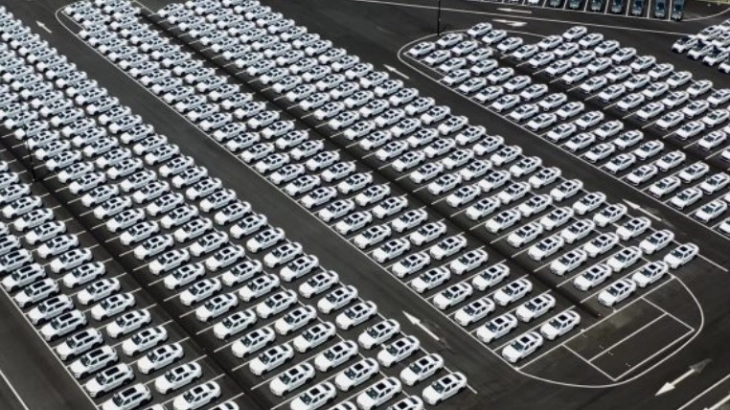EU carries out threat of provisional tariffs on e-cars from China
- The European Union has carried out its threat to impose provisional tariffs on imports of electric cars from China of up to 37.6%, the bloc's Official Journal announced on Thursday.
- Post By Ivan Kolekevski
- 14:48, 4 July, 2024

Brussels, 4 July 2024 (dpa/MIA) - The European Union has carried out its threat to impose provisional tariffs on imports of electric cars from China of up to 37.6%, the bloc's Official Journal announced on Thursday.
Chinese companies affected include BYD, a major sponsor of the Euro 2024 football tournament in Germany, hit with tariffs of 17.4%, Geely at 19.9% and SAIC at 37.6%.
The threat of provisional tariffs on electric cars dates to last month after an investigation by the European Commission found evidence of illegal support from Chinese state subsidies.
Tensions over Chinese exports have been rising in recent months, with the United States and the EU accusing Beijing of supporting sectors like green technologies with massive state subsidies.
With the risk of a trade war with Beijing looming, the punitive EU measures become final within four months after a proposal from the European Commission, unless China makes concessions.
Until then, a security deposit has to be paid instead of a tariff. The import duties could be retroactively withdrawn if the two sides reach an agreement.
Reacting to the tariffs, a spokesman for China's Ministry of Commerce said that Beijing hopes to find a solution with the EU as soon as possible and that there is still time to resolve the issue.
While China has agreed to cooperate with the bloc to avert the tariffs, Beijing's trade authorities have launched an investigation into subsidies for pork and dairy products from the EU.
Previously, the Chinese Trade Ministry said it was probing brandy imports from the EU, with both anti-dumping probes viewed as a response to the EU's import tariffs on electric vehicles from China.
The commission officially launched an investigation last autumn into Chinese electric vehicles to see if economic competition was distorted.
"The price of these cars is being artificially reduced by huge state subsidies, and this is distorting our market," Ursula von der Leyen, the commission's president, said as she announced the probe.
According to the commission, Chinese electric cars are normally around 20% cheaper than models built in the EU.
Manufacturers in China that cooperated with the probe were subjected to a 20.8% tariff. Non-cooperative electric car producers were hit with 37.6%.
Existing EU tariffs on all non-EU manufacturers of cars stand at 10%.
The German government, and the country's massive automotive manufacturing industry, has spoken out against the tariffs, fearing retaliation from Beijing on German car exports.
A fierce price war has been raging among electric car manufacturers in China for some time. Meanwhile, German brands want to take on competitors such as US car manufacturer Tesla and Chinese brands such as BYD or Nio.
However, BMW, Mercedes, VW and other companies could be the first target of possible Chinese countermeasures should the potential tariffs lead to a wider trade conflict.
German Economy Minister Robert Habeck has urged the EU and China to pursue talks to resolve the trade dispute.
"It would be really bad if tariffs were used as a protectionist tool, if we entered into a tariff race with China," Habeck said. "Then the baby would be thrown out with the bathwater."
Talks between Chinese Commerce Minister Wang Wentao and EU Trade Commissioner Valdis Dombrovskis to address the issue were held in June.
However the question of whether both sides can solve the issue is still open.
The commission has repeatedly stressed that a negotiation outcome must eliminate the influence of harmful subsidies. Talks between Brussels and Beijing are to continue in the coming weeks.
If the EU executive arm concludes that China is not making sufficient progress, it can present a proposal for the introduction of definitive punitive tariffs in the next four months.
EU member states could only stop the proposed tariffs if a so-called qualified majority votes against the proposal.
As a rule, a qualified majority means that at least 15 EU countries, which together make up at least 65% of the total population of the bloc, must vote in favour.
If there is no qualified majority in favour of or against the proposal, the commission can either adopt it or submit a new, amended version.







